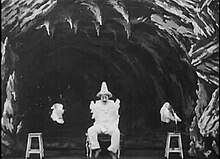Dislocation Extraordinary (French: Dislocation mystérieuse), also known as Extraordinary Illusions, is a 1901 French silent trick film by Georges Méliès. It was sold by Méliès's Star Film Company and is numbered 335–336 in its catalogues. [1]
| Dislocation Extraordinary | |
|---|---|
 A frame from the film | |
| Directed by | Georges Méliès |
| Starring | André Deed |
Production company | |
Release date |
|
| Country | France |
| Language | Silent |
Production and themes
editThe film is one of many in which Méliès plays with the idea of living body parts separated from their body;[2] living dismembered limbs had been a feature of stage magic for some time, notably in the work of Nevil Maskelyne, one of Méliès's major influences.[3] For Dislocation Extraordinary, Méliès combined this stage-magic tradition with the stock character of Pierrot, a commedia dell'arte character. The character had been familiar in Méliès's France since Jean-Gaspard Deburau's revival of commedia techniques in the first half of the 19th century.[3]
The special effects were carried out with substitution splices and multiple exposures,[2] aided by a black cloth background.[3]
The film's Pierrot is played by André Deed, a music-hall acrobat. He worked with Méliès for some years,[3] leaving in 1904 when he was hired by Pathé, to whom he revealed some of Méliès's secrets for special effects. Deed's later work includes the Cretinetti (Foolshead) series.[2] Méliès returned to Dislocation Extraordinary's "free-floating limbs" in 1903, when he featured them again in his film The Infernal Cakewalk.[3]
Release
editThe film's title for English-language markets was Dislocation Extraordinary; however, Méliès scholar John Frazer, confusing it with a later Méliès film, referred to it as Extraordinary Illusions.[2] The latter title is also used for the film on at least one home video release.[4]
References
edit- ^ Malthête, Jacques; Mannoni, Laurent (2008), L'oeuvre de Georges Méliès, Paris: Éditions de La Martinière, p. 343, ISBN 9782732437323
- ^ a b c d Essai de reconstitution du catalogue français de la Star-Film; suivi d'une analyse catalographique des films de Georges Méliès recensés en France, Bois d'Arcy: Service des archives du film du Centre national de la cinématographie, 1981, pp. 96–97, ISBN 2903053073
- ^ a b c d e Frazer, John (1979), Artificially Arranged Scenes: The Films of Georges Méliès, Boston: G. K. Hall & Co., p. 88, ISBN 0816183686
- ^ Méliès, Georges (2008), Georges Méliès: First Wizard of Cinema (DVD; short film collection), Los Angeles: Flicker Alley, ISBN 1893967352